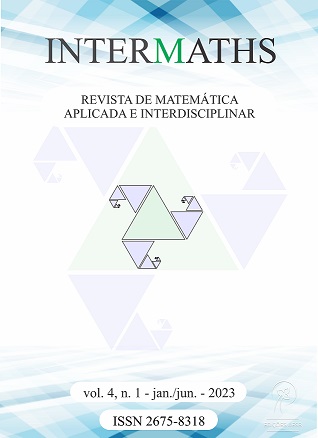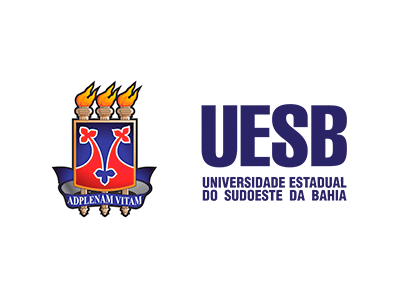Simulation of the Onset turbulent flow around a Isothermal Complex Geometries: an analysis of thermofluid dynamic flow
DOI:
https://doi.org/10.22481/intermaths.v4i1.12683Palavras-chave:
Immersed Boundary Method, Mixed Convection, Onset Turbulence, Isothermal Bluff BodyResumo
In this work, in the area of Computational Fluid Dynamics (CFD), more specifically in the area of thermofluid dynamics for two-dimensional flows (2D), and also considering, the fluid-body interaction, allied to the phenomena of heat-transfer by mixed convection and the beginning of processes of the turbulent flow phenomenon in the fluid-body interaction, a study is proposed that demonstrates the efficiency in the analysis and simulation of these complex phenomena. We adopt an Eulerian approach for a fixed mesh, which is intended to represent the thermofluid dynamic movement, working together with a Lagrangian mesh, the latter being intended to discretize the immersed body. The strategy, in this work, allows approaching complex isothermal geometries, which present a certain aerodynamic degree on their surface, being popularly known as blunt body, where this, in turn, is immersed in an incompressible Newtonian fluid. One of the contributions of this work is the introduction of a simple but efficient method to calculate the Nusselt number. Regarding the process of validation and modeling of the physical phenomena of interest, that is, regarding the effectiveness of the methodology, called the Immersed Frontier, an implementation with low computational cost was carried out for the transfer of mixed convection heat, as well as for modeling the turbulence, namely, making use of the Spalart-Allmaras model, in the context of the URANS (Unsteady Reynolds Average Navier -Stokes) methodology. Numerical results showed good convergence with data available in the literature, which confirms the numerical precision and reliability of the adopted model.
Downloads
Metrics
Referências
Peskin, C. S. (1972). Flow Patterns Around Heart Valves: A Numerical Method. J. Comput.
Phys., 10(2), 252–271. https://doi.org/10.1016/0021-9991(72)90065-4
Peskin, C. S. (1977). Numerical Analysis of Blood Flow in the Heart. J. Comput. Phys.,
, 220–252.
Park, S. G., Chang, C. B., Kim, B. and Sung, H. J. (2017). Simulation of Fluid-Flexible Body Interaction with Heat Transfer. Int. J. Heat Mass Transfer, 110, 20–33. https://doi.org/10.1016/j.ijheatmasstransfer.2017.03.012
Ashrafizadeh, A. and Hosseinjani, A. A. (2017). A Phenomenological Study on the Convection Heat Transfer around Two Enclosed Rotating Cylinders via an Immersed Boundary Method. Int. J. Heat Mass Transfer, 107, 667–685. https://doi.org/10.1016/j.ijheatmasstransfer.2016.11.078
Mittal, R. and Iaccarino, G. (2005). Immersed Boundary Method. Annu. Rev. Fluid Mech., 37, 239–261. https://doi.org/10.1146/annurev.fluid.37.061903.175743
Lai, M. C., & Peskin, C. S. (2000). An Immersed Boundary Method with Formal Second-Order Accuracy and Reduced Numerical Viscosity. J. Comput. Phys., 160(2), 705–719. https://doi.org/10.1006/jcph.2000.6483
Goldstein, D., Handler, R., & Sirovich, L. (1993). Modeling a No-slip Flow Boundary with an External Force Field. J. Comput. Phys., 105(2), 354–366. https://doi.org/10.1006/jcph.1993.1081
Yang, Q. and Cao, S. (2013). Numerical Simulation of Flow around Bluff Bodies Based on Virtual Boundary Method. The 8th Asia–Pacific Conference on Wind Engineering, Chennai, pp. 10-14, 582-591. https://doi.org/10.3850/978-981-07-8012-8_154
Mohd-Yusof, J. (1997). For simulations of flow in complex geometries. Annual Research Briefs, 317.
Ye, T., Mittal, R., Udaykumar, H. S., & Shyy, W. (1999). An Accurate Cartesian Grid Method for Viscous Incompressible Flows with Complex Immersed Boundaries. J. Comput. Phys., 156(2), 209–240. https://doi.org/10.1006/jcph.1999.6356
Santos, R. D., Gama, S. M., & Camacho, R. G. (2018). Two-Dimensional Simulation of the Navier-Stokes Equations for Laminar and Turbulent Flow around a Heated Square Cylinder with Forced Convection. Applied Mathematics, 9(03), 291–312. https://doi.org/10.4236/am.2018.93023
Silva, A. L. E., Silveira-Neto, A. and Damasceno, J. J. R. (2003). Numerical Simulation of Two-Dimensional Flows over a Circular Cylinder using the Immersed Boundary Method. J. Comput. Phys., 189, 351–370. https://doi.org/10.1016/s0021-9991(03)00214-6
Chorin A. J. (1968). Numerical Solution of the Navier-Stokes Equations. Mathematics of computation;22(104):745–762. https://doi.org/10.1090/s0025-5718-1968-0242392-2
Chatterjee, D. (2010). Mixed Convection Heat Transfer from Tandem Square Cylinder in Vertical Channel at Low Reynolds Numbers. Numerical Heat Transfer, Part A: Applications, 58(9), 740–755. https://doi.org/10.1080/10407782.2010.516703
Singh, S., Panigrahi, P. & Muralidhar, K. (2007). Effect of Bouyancy on the Wakes of Circular and Square Cylinders: A Schlieren-Interferometric Study. Experiments in fluids, 43(1):101–123. https://doi.org/10.1007/s00348-007-0329-8
Moulay, M. A., Belkady, M., Aounallah, A. et.al. (2017). Effect of Opposing Bouyancy on Two-dimensional Laminar Flow and Heat Transfer Across a Confined Circular Cylinder. Mechanics, 23(6):859–865. https://doi.org/10.5755/j01.mech.23.6.17291
Anjaiah, N., Dhiman, A. & Chhabra, R. (2006). Mixed Convection Heat Transfer from a Square Cylinder to Power-Law Fluids in Cross-Flow. In AMSE 2006 2nd Joint USEuropen Fluids Engineering Summer Meeting Collocated with the 14th International Conference on Nuclear Engineering, pp. 1435–1444. American Society of Mechanical Engineers. https://doi.org/10.1115/fedsm2006-98072
Dhiman, A., Anjaiah, N., Chhabra, R. & Eswaran, V. (2007). Mixed Convection from Heated Square Cylinder to Newtonian and Power-Fluids. Journal of Fluids Engineering, 129(4):506-513. https://doi.org/10.1115/1.2436586
Sharma, N., Dhiman, A. K., & Kumar, S. (2012). Mixed Convection Flow and Heat Transfer Across a Square Cylinder Under the Influence of Aiding Buoyancy at Low Reynolds Numbers. Int. J. Heat Mass Transfer, 55(9-10), 2601–2614. https://doi.org/10.1016/j.ijheatmasstransfer.2011.12.034
Breuer, M., Bernsdorf, J., Zeiser, T. & Durst. F. (2000). Accurate Computations of the Laminar Flow Past a Square Cylinder Based on Two Different Methods: Lattice-Boltzmann and Finite Volume. International Journal of Heat and Fluid Flow, 21(2):186–196. https://doi.org/10.1016/s0142-727x(99)00081-8
Kim, J., Kim, D. & Cho, H. (2001). An Immersed-Boundary Finite-Volume Method for Simulations of Flow in Complex Geometries. J. Comput. Phys., 171(1):132–150. https://doi.org/10.1006/jcph.2001.6778.
Kim, J. & Cho, H. (2004). An Immersed-Boundary Finite-Volume Method for Simulation of Heat Transfer in Complex Geometries. KSME International Journal, 18(6):1026–1035. https://doi.org/10.1007/bf02990875
Perumal, D. A., Kumar, G. V., & Dass, A. K. (2012). Numerical Simulation of Viscous Flow over a Square Cylinder Using Lattice Boltzmann Method. ISRN Mathematical Physics,2012. https://doi.org/10.5402/2012/630801
Sharma, A. (2003). Numerical Investigation of Unconfined and Channel-Confined Flow Across a Square Cylinder with Forced and Mixed Convection Heat Transfer. Ph.D. thesis, Indian Institute of Technology Kanpur, India.
Sharma, A. & Eswaran, V. (2004). Effect of Aiding and Opposing Buoyancy on the Heat and Fluid Flow Across a Square Cylinder at Re = 100. Numerical Heat Transfer, Part A: Applications, 45(6):601–624. https://doi.org/10.1080/10407780490277798
Sohankar, A. & Etminan, A. (2009). Forced-Convection Heat Transfer from Tandem Square Cylinders in Cross Flow at low Reynolds Numbers. International Journal for Numerical Methods in Fluids, 60(7):733–751. https://doi.org/10.1002/fld.1909
Yen, S., San, K., & Chuang, T. (2008). Interactions of Tandem Square Cylinders at Low Reynolds Numbers. Experimental Thermal and Fluid Science, 32(4):927–938. https://doi.org/10.1016/j.expthermflusci.2007.07.001
Smagorinsky, J. (1963) General Circulation Experiments with the Primitive Equations: I. The Basic Experiment. Monthly Weather Review, 91, 99–164. https://doi.org/10.1175/1520-0493(1963)091%3C0099:gcewtp%3E2.3.co;2
Spalart, P. & Allmaras, S. (1992). A One-Equation Turbulence Model for Aerodynamics Flows. Recherce Aeropatiale, No. 1, 5–21.
Mahir, N. & Alta , Z.(2008). Numerical Investigation of Convective Heat Transfer in Unteady Flow Past Two Cylinders in Tandem Arragements. International Journal of Heat and Fluid Flow, 29(5):1309–1318. https://doi.org/10.1016/j.ijheatfluidflow.2008.05.001
Sohankar, A., Norberg, C. & Davidson, L. (1999). Simulation of Three-Dimensional Flow Around a Square Cylinder at Moderate Reynolds Numbers. Physics of Fluids, 11(2): 288–306. https://doi.org/10.1063/1.869879
Santos, R. D. C. d. (2014). An lise Bidimensional Termo-Fluido Din mica de Cilindros Rotativos com o Método da Fronteira Imersa/Modelo Físico Virtual. Master’s thesis. Universidade Federal de Itajub - Minas Gerais, Brazil.
Laidoudi, H. & Bouzit, M. (2016). Mixed Convection in Poiseuille Fluid from an Asymmetrically Confined Heated Circular Cylinder. Thermal Science, (00): 172–172.
Zdravkovich, M. (1985). Flow Induced Oscillations of Two Interfering Circular Cylinders. Journal of Sound and Vibrations, 101(4): 511–521. https://doi.org/10.1016/s0022-460x(85)80068-7
Downloads
Publicado
Como Citar
Edição
Seção
Licença
Copyright (c) 2023 INTERMATHS

Este trabalho está licenciado sob uma licença Creative Commons Attribution 4.0 International License.
 All content of Revista INTERMATHS/Journal INTERMATHS is licensed under a Creative Commons - Atribuição 4.0 Internacional (CC-BY 4.0).
All content of Revista INTERMATHS/Journal INTERMATHS is licensed under a Creative Commons - Atribuição 4.0 Internacional (CC-BY 4.0).







